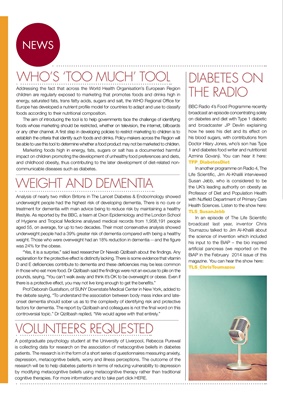
NEWS
DIABETES ON
THE RADIO
WEIGHT AND DEMENTIA
WHO'S 'TOO MUCH' TOOL
BBC Radio 4's Food Programme recently
broadcast an episode concentrating solely
on diabetes and diet with Type 1 diabetic
and broadcaster JP Devlin explaining
how he sees his diet and its effect on
his blood sugars, with contributions from
Doctor Hilary Jones, who's son has Type
1 and diabetes food writer and nutritionist
Azmina Govanji. You can hear it here:
TFP_DiabetesDiet
In another programme on Radio 4, The
Life Scientific, Jim Al-Khalili interviewed
Susan Jebb, who is considered to be
the UK's leading authority on obesity as
Professor of Diet and Population Health
with Nuffield Department of Primary Care
Health Sciences. Listen to the show here:
TLS_SusanJebb
In an episode of The Life Scientific
broadcast last year, inventor Chris
Toumazou talked to Jim Al-Khalili about
the science of invention which included
his input to the BiAP - the bio inspired
artificial pancreas (we reported on the
BiAP in the February 2014 issue of this
magazine. You can hear the show here:
TLS_ChrisToumazou
Analysis of nearly two million Britons in The Lancet Diabetes & Endocrinology showed
underweight people had the highest risk of developing dementia, There is no cure or
treatment for dementia with main advice being to reduce risk by maintaining a healthy
lifestyle. As reported by the BBC, a team at Oxon Epidemiology and the London School
of Hygiene and Tropical Medicine analysed medical records from 1,958,191 people
aged 55, on average, for up to two decades. Their most conservative analysis showed
underweight people had a 39% greater risk of dementia compared with being a healthy
weight. Those who were overweight had an 18% reduction in dementia -- and the figure
was 24% for the obese.
"Yes, it is a surprise," said lead researcher Dr Nawab Qizilbash about the findings. Any
explanation for the protective effect is distinctly lacking. There is some evidence that vitamin
D and E deficiencies contribute to dementia and these deficiencies may be less common
in those who eat more food. Dr Qizilbash said the findings were not an excuse to pile on the
pounds, saying, "You can't walk away and think it's OK to be overweight or obese. Even if
there is a protective effect, you may not live long enough to get the benefits."
Prof Deborah Gustafson, of SUNY Downstate Medical Center in New York, added to
the debate saying, "To understand the association between body mass index and lateonset dementia should
sober us as to the complexity of identifying risk and protective
factors for dementia. The report by Qizilbash and colleagues is not the final word on this
controversial topic." Dr Qizilbash replied, "We would agree with that entirely."
VOLUNTEERS REQUESTED
A postgraduate psychology student at the University of Liverpool, Rebecca Purewal
is collecting data for research on the association of metacognitive beliefs in diabetes
patients. The research is in the form of a short series of questionnaires measuring anxiety,
depression, metacognitive beliefs, worry and illness perceptions. The outcome of the
research will be to help diabetes patients in terms of reducing vulnerability to depression
by modifying metacognitive beliefs using metacognitive therapy rather than traditional
cognitive therapies. For more information and to take part click HERE.
Addressing the fact that across the World Health Organisation's European Region
children are regularly exposed to marketing that promotes foods and drinks high in
energy, saturated fats, trans fatty acids, sugars and salt, the WHO Regional Office for
Europe has developed a nutrient profile model for countries to adapt and use to classify
foods according to their nutritional composition.
The aim of introducing the tool is to help governments face the challenge of identifying
foods whose marketing should be restricted, whether on television, the internet, billboards
or any other channel. A first step in developing policies to restrict marketing to children is to
establish the criteria that identify such foods and drinks. Policy-makers across the Region will
be able to use this tool to determine whether a food product may not be marketed to children.
Marketing foods high in energy, fats, sugars or salt has a documented harmful
impact on children promoting the development of unhealthy food preferences and diets,
and childhood obesity, thus contributing to the later development of diet-related noncommunicable diseases such as diabetes.